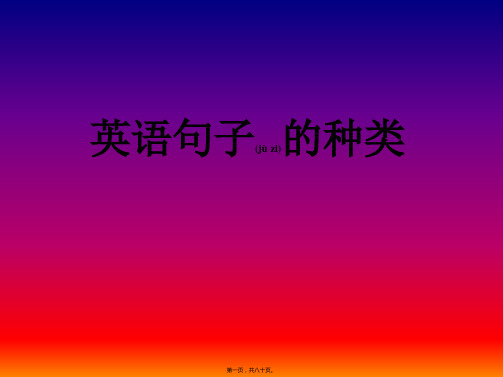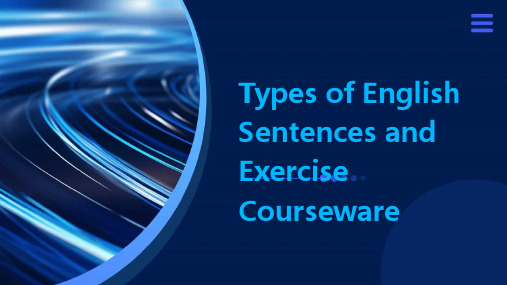英语句子的种类及练习课件
合集下载
英语句子的种类及练习课件

其它动词:
1. You will go to America, __w_o__n_’__t _y?ou 2. We have ever been to Shanghai,
__h__a_v_e_n_’_ _t___w_e_ ?
第十三页,共八十页。
C、特殊(tèshū)用法(一)
1. His mother is a doctor, ___i_s_n_’_t__s_h?e 2. The dogs are fighting, __a__re_n_’_ _t__t_h_e?y 3. There is a boy in our classroom, 4. _is__n_’__t_ __t_h_e_r_e_ ?
(3) or not构成的选择疑问句 Do you want to buy it or not?
第九页,共八十页。
4): 反意 疑问句 (fǎn yì)
A、含义:
在一个陈述句之后附上一个简
短的疑问(yíwèn)句,对陈述句提出相反
的疑问 ,这种疑问 句叫反意疑 (yíwèn)
(yíwèn)
问 句。 如: (yíwèn)
1. He is clever, isn’t he?
2. We speak Chinese, don’t we?
第十页,共八十页。
B、结构 : (jiégòu)
结构 一: (jiégòu) 前肯,+ 后否 eg. He is clever, isn’t he?
结构 二: (jiégòu) 前否,+ 后肯 eg. He isn’t clever, is he?
Did someone phone me last night? 否定疑问句 Can’t you understand it?
1. You will go to America, __w_o__n_’__t _y?ou 2. We have ever been to Shanghai,
__h__a_v_e_n_’_ _t___w_e_ ?
第十三页,共八十页。
C、特殊(tèshū)用法(一)
1. His mother is a doctor, ___i_s_n_’_t__s_h?e 2. The dogs are fighting, __a__re_n_’_ _t__t_h_e?y 3. There is a boy in our classroom, 4. _is__n_’__t_ __t_h_e_r_e_ ?
(3) or not构成的选择疑问句 Do you want to buy it or not?
第九页,共八十页。
4): 反意 疑问句 (fǎn yì)
A、含义:
在一个陈述句之后附上一个简
短的疑问(yíwèn)句,对陈述句提出相反
的疑问 ,这种疑问 句叫反意疑 (yíwèn)
(yíwèn)
问 句。 如: (yíwèn)
1. He is clever, isn’t he?
2. We speak Chinese, don’t we?
第十页,共八十页。
B、结构 : (jiégòu)
结构 一: (jiégòu) 前肯,+ 后否 eg. He is clever, isn’t he?
结构 二: (jiégòu) 前否,+ 后肯 eg. He isn’t clever, is he?
Did someone phone me last night? 否定疑问句 Can’t you understand it?
句子的种类(50张PPT)初中英语专项复习课件

2.一般疑问句的回答 一般疑问句的肯定回答通常用“Yes,主语+be动词/情态动词/助动词”; 否定回答通常用“No,主语+be动词/情态动词/助动词+not”。not 习 惯上与前面的be动词、情态动词或助动词构成缩写词,但是be动词am 除 外。
三、选择疑问句 1.选择疑问句的回答 选择疑问句一般不用yes或no回答,而是选择一种情况回答。如: —Which one do you prefer,the red one or the blue one? 你更喜欢哪一件,红色的还是蓝色的? —I prefer the red one.我更喜欢红色的。
3.表示部分否定的词,如not all,not everything,not everybody,not everywhere,not always等。如: Not all students go to school by bike.不是所有的学生都骑自行车上 学。 4.宾语从句的否定形式:当主语为第一人称,谓语为 think,believe,suppose等词时,形式上否定主句实则否定宾语从句。如: I don’t think he’ll come. 我认为他不会来。
答案 A
解析 考查动词时态,本句为陈述句。句意:自从我来到长沙我们就没见过
面,但我们经常发邮件。根据since I came to Changsha可知,句子时态
为现在完成时,其构成为:have/has+动词过去分词,故选A项。
考点清单
分类
意义
肯定句
表示肯定的陈述
否定句
表示否定的陈述
例句
I get up at 6 o’clock every morning. 我每天早上六点起床。
基本句型和句子种类(22张PPT)初中英语专项复习课件

• Wh- questions usually include the verbs be, have, do, or any of the helping verbs. • To ask for facts, use the question words what, which, who, whom, how, when, where.
Sentence
• Imperatives are a very direct way of telling people to do something. Using do or please before an imperative is more polite.
• 祈使句是告诉人们做某事的一种非常直接的方式。在祈使句之前使用do或please更有礼貌。 • Do sit down. • Do check these figures again. • Please help yourselves to some food. • Please don’t change anything on • my computer.
The helping verbs in wh- questions usually come before the subject. • So does the verb be when it is used as an ordinary verb.当be用作普通动词时也是如此。 • 例如: • Where are you? • What is David saying? • How did you get up here? • Why was the girl crying? • Which color do you prefer?
Sentence
英语句子成分及五种基本句型解析ppt课件

篮球比赛是根据运动队在规定的比赛 时间里 得分多 少来决 定胜负 的,因 此,篮 球比赛 的计时 计分系 统是一 种得分 类型的 系统
基本句型1:主+谓
此句型的句子有一个共同特点,即句子的谓语动词都能表达 完整的意思。 这类动词叫做不及物动词,后面可以跟副词、介词短语、 状语从句等。
•The sun was shining.
介词短语
My job is to teach English.
不定式
Seeing is believing.
动名词
篮球比赛是根据运动队在规定的比赛 时间里 得分多 少来决 定胜负 的,因 此,篮 球比赛 的计时 计分系 统是一 种得分 类型的 系统
基本句型2:主有一个共同的特点:句子谓语动词都不能表达一个完整的 意思,必须加上一个表明主语身份或状态的表语构成复合谓语,才能表 达完整的意思。这类动词叫做连系动词。
太阳在照耀着。
2. Who cares?
管它呢?
3. What he said does not matter. 他所讲的没有什么关系。
4. They talked for half an hour. 他们谈了半个小时。
篮球比赛是根据运动队在规定的比赛 时间里 得分多 少来决 定胜负 的,因 此,篮 球比赛 的计时 计分系 统是一 种得分 类型的 系统
什么可以作谓语?
We love China. We have finished reading this book. He can speak English.
及物动词 vt
My mother usually gets up early. The boy often plays in his yard. 不及物动词 vi
句子的种类(陈述句、疑问句、祈使句、感叹句、倒装句)初中英语专项复习课件(18张PPT)

ห้องสมุดไป่ตู้
—________.
A.So do I
B.So am I
C.Neither am I D.Neither do I
( )5. —________ can we find your brother at weekends?
—On the football field.
A.When
B.Which
C.Why
(2)What+形容词+复数可数名词/不可数名词(+主语+谓 语)!如:What useful information!
2.how引导的感叹句。 (1)How+形容词/副词+主语+谓语!如: How kind they are! (2)How+陈述句(主语+谓语)!如: How time flies! 3.what引导的感叹句可以和how引导的感叹句互换。如: What a good girl! = How good the girl is!
She seldom goes swimming, does she?
(4)陈述部分的主语为指物的不定代词时,问句部分的主语 用it。如:
Something is wrong with the computer, isn't it?
(5)陈述部分的主语为指人的不定代词时,问句部分的主语 用he或 they,这时问句动词的数应和he或 they一致。如:
1.一般疑问句:通常用来询问一件事情是否属实。答句 通常是“Yes”或“No”。如:
—Are you tired? —Yes, I am.“你累吗?”“是的,我累。”
2.选择疑问句:指提出两个或两个以上可能的答案供对 方选择。如:
Shall we go home or stay here for the night? 我们回家还是 待在这里过夜?
—________.
A.So do I
B.So am I
C.Neither am I D.Neither do I
( )5. —________ can we find your brother at weekends?
—On the football field.
A.When
B.Which
C.Why
(2)What+形容词+复数可数名词/不可数名词(+主语+谓 语)!如:What useful information!
2.how引导的感叹句。 (1)How+形容词/副词+主语+谓语!如: How kind they are! (2)How+陈述句(主语+谓语)!如: How time flies! 3.what引导的感叹句可以和how引导的感叹句互换。如: What a good girl! = How good the girl is!
She seldom goes swimming, does she?
(4)陈述部分的主语为指物的不定代词时,问句部分的主语 用it。如:
Something is wrong with the computer, isn't it?
(5)陈述部分的主语为指人的不定代词时,问句部分的主语 用he或 they,这时问句动词的数应和he或 they一致。如:
1.一般疑问句:通常用来询问一件事情是否属实。答句 通常是“Yes”或“No”。如:
—Are you tired? —Yes, I am.“你累吗?”“是的,我累。”
2.选择疑问句:指提出两个或两个以上可能的答案供对 方选择。如:
Shall we go home or stay here for the night? 我们回家还是 待在这里过夜?
英语句子的种类及练习课件

are, object: interesting)
03
Compound sentence
I enjoy reading books that are very interesting (Using the
attributive clause guided by 'that' to connect two simple
"She has a beautiful smile."
02
CATALOGUE
Compound presence
Definition
Compound sentence
A complete sentence formed by connecting two or more simple sentences with conjunctions.
A clause is a sentence used to modify a noun, pronoun, or the entire sentence in the main sentence.
Complex sentences are usually longer than simple sentences, containing more vocabulary and grammatical
Structure
1 2
Subject+predicate
This is the basic structure of a simple sentence, such as "I love English".
Subject+predicate+object
Add an object in a simple sentence, such as "I like reading books".
句子的种类(22张PPT)初中英语专项复习课件

English is the easiest subject to learn
5.is, a, what, useful, it, subject__________________________!
What a useful subject it is
6.you, her, do, remember______________________?
考点3 祈使句
祈使句表示命令、请求、建议或劝告等。其主语通常被省略,谓语动词用原形,句末用句号或感叹号。
肯定祈使句
1.(Please)+动词原形+其他Listen to English songs when you are free.
2.Let+第一、三人称的宾格/名词+动词原形+其他Let the students come in!
What present did you buy
15.out, who, find, help, needs_________________________.
Find out who needs help
感谢您的观看
Do you remember her
7.it, when, you, did, take______________________?
When did you take it
8.beautiful, look, the, at, flowers____________________________.
What引导的感叹句
1.What + a/an + 形容词 + 可数名词单数形式(+ 主语 + 谓语)!●What a beautiful skirt!●What an exciting speech our headmaster gave just now![2022滨州中考]
5.is, a, what, useful, it, subject__________________________!
What a useful subject it is
6.you, her, do, remember______________________?
考点3 祈使句
祈使句表示命令、请求、建议或劝告等。其主语通常被省略,谓语动词用原形,句末用句号或感叹号。
肯定祈使句
1.(Please)+动词原形+其他Listen to English songs when you are free.
2.Let+第一、三人称的宾格/名词+动词原形+其他Let the students come in!
What present did you buy
15.out, who, find, help, needs_________________________.
Find out who needs help
感谢您的观看
Do you remember her
7.it, when, you, did, take______________________?
When did you take it
8.beautiful, look, the, at, flowers____________________________.
What引导的感叹句
1.What + a/an + 形容词 + 可数名词单数形式(+ 主语 + 谓语)!●What a beautiful skirt!●What an exciting speech our headmaster gave just now![2022滨州中考]
句子的种类(20张PPT)初中英语专项复习课件

他?
(2)特殊疑问句
用特殊疑问词(组)引导的疑问句叫作特殊疑问句,回答时不能使用yes或no,
而是根据实际情况作答。
疑问词(组)
含义及用法
例句
who which what
“谁”,询问身份
“哪一个”,询问特定的人或 物 “什么”,询问职业或身份等
Who is the man under the tree? 树底下的那个男人是谁? Which book do you like?你喜欢 哪一本书? —What is he?他是干什么的? —He's a teacher.他是一名教师。
句子的种类
初中英语专项复习
1.陈述句
构成
谓语动词不含否定词。分为两 肯定 形式 种,一种为正常语序,一种为倒
装语序
例句 ①My parents are both doctors. 我的父 母都是医生。 ②In the center of the city is a big park.这个城市中心有一个大公园。
Tom doesn't like playing the piano. 汤 姆不喜欢弹钢琴。
构成 除not外,使用其他否定词也可构 成否定句,如no,never, 否定 形式 seldom,hardly,nothing, neither,nobody,few,little, nhave never been to Shanghai. 我从 来没有去过上海。 ②None of these pens works/work. 这 些钢笔没有一支能用。
11.(2023吉林改编)—__H_o_w__f_a_r_ is it from our school to the new bookstore, Li Lei? —Only one kilometer. 12.(2023营口改编)—Lingling, _h_o_w___s_o_o_n_ will your brother come back from abroad? —Hmm, in a week. 13.(2023宿迁改编)—China won all the gold medals at the 2023 World Table Tennis Championships. —_W__h_a_t_exciting news!
- 1、下载文档前请自行甄别文档内容的完整性,平台不提供额外的编辑、内容补充、找答案等附加服务。
- 2、"仅部分预览"的文档,不可在线预览部分如存在完整性等问题,可反馈申请退款(可完整预览的文档不适用该条件!)。
- 3、如文档侵犯您的权益,请联系客服反馈,我们会尽快为您处理(人工客服工作时间:9:00-18:30)。
What beautiful flowers (they are)! 3.“What + 形容词 + 不可数名词 + (主语 + 谓 语)!”如:
What fresh milk (it is)! What fun!
二)以how开头的感叹句
1.“How + 形容词 + 主语 + 谓语!”如:
How beautiful the girl is! 2.“How + 形容词 + a(an) + 单数可数名词 + (主语 + 谓 语) +……!”如:
you last night, ___w_e_r_e_n_’_t_ _y_o_u__ ? 5. She is going to visit me, _i_s_n_’_t _s_h_e_? 6. I am Chinese, _a_r_e_n_’t_ __I____?
行为动词:
1. It often rains here, _d__o_e_s_n_’_t _i_t _ ? 2. He likes soccer, __d_o__e_s_n_’_t _h__e_ ? 3. You have a headache, _d__o_n_’_t _ y__o_u? 4. I called you yesterday, _d_i_d_n_’_t_ _I_?
3)否定转移 I don’t think it will be very cold today. (believe, expect, suppose, imagine)提出问题,询问 情况。
(2)、疑问句 的分类
❖ 分为一般疑问句、选择疑问句、特殊疑问句和反 意疑问句。
结构一: 前肯,+ 后否
Be 动词:
1. You are an actor, __a_r_e_n__’t_ __y_o_u_ ? 2. He is a good boy, ___i_s_n_’t__ ___h_e__ ? 3. It was fine yesterday, _w_a__s_n_’t_ _i_t_ ? 4. You were studying when I called
结构二: 前否,+ 后肯
1. You aren’t an actor, ___a_r_e_ _y_o_u_ ? 2. He isn’t a good boy, ____i_s_ _h__e__ ? 3. It wasn’t fine yesterday, _w_a_s_ __i_t_ ? 4. It doesn’t rain here, __d_o_e_s_ __i_t _ ? 5. His sister doesn’t have a headache,
How old is he?
Is he six or seven years old? Mary can swim, can’t she?
3 、祈使句:
Be careful, boys; Don’t talk in class
4 、感叹句:How clever the boy is!
4、“感叹句”
所谓感叹句,就是用来表达喜怒哀 乐等强烈感情的句子。
What a good time we had last night! What interesting films ! What fine weather we have today! How foolish she is! How clearly you speak! How clever a boy he is!
❖ 第一步:“一分”, ❖ 即在谓语动词后面划一双竖线,使句子分为两部
分。如:
❖ He is ‖a very honest boy. ❖ 他是一个诚实的孩子。
❖ Li Lei works‖ very hard. ❖ 李雷学习很刻苦。
第二步:“二加” 即如果第二部分的中心词是名词, 就加上what; 如果是形容词或副词,就加上how. 如:
其它动词:
1. You will go to America, _w_o__n_’t_ _y_o_u? 2. We have ever been to Shanghai,
__h_a_v_e_n__’t_ __w_e___ ?
C、特殊用法(一)
1. His mother is a doctor, __is_n__’t_ _s_h_e_ ? 2. The dogs are fighting, _a_r_e_n__’t_ _t_h_e_y_? 3. There is a boy in our classroom,
三、特殊用法(二)
6. Sit down please, _w__il_l_/_w__o_n_’_t _y_o_u_ ? 7. Please call me, __w_i_ll__/ _w_o_n__’t_y__o_u__?
8. Let’s go home, _s_h_a_l_l_/_s_h__a_n_’t__w_e_ ? 9. Let us go home, _w_i_ll__/ _w_o_n__’t__y_o_u__ ? 10. Let me see, __w__il_l _/_w__o_n_’_t _y_o__u__ ?
___d_o_e_s__ _s_h_e__ ? 6. You didn’t call me yesterday,
__d_i_d___ _y_o_u__?
7. You won’t go to U.S.A., __w_i_ll__ _y_o_u_?
8. There isn’t a boy in our classroom,
B、复杂特殊疑问句
What do you think he has done?
3)选择疑问句
❖ 选择疑问句(alternative questions) ❖ 一般提出两种或两种以上的可能,问对方选择哪
一种。 ❖ 其结构可用一般疑问句,也可用特殊疑问句,供
选择的两部分由or连接,前者用升调,后者用降 调,如:
1)一般疑问句 用来询问一件事,答案通常是yes或 no,注意语序。
Have you anything to say? Did someone phone me last night? 否定疑问句 Can’t you understand it? Isn’t it a beautiful lake?
___i_s__ _t_h_e_r_e__ ? 9. There weren’t many cars in the street,
_w__e_r_e__ _t_h_e_r_e__ ? 10. Don’t smoke, ____w_i_ll_ __y_o_u_ ? 11. Don’t let’s do it, ___s_h_a_l_l __w_e__ ?
Which do you prefer, red wine or white? How shall we go there? By bus or by train? (3) or not构成的选择疑问句
Do you want to buy it or not?
4): 反意疑问句
A、含义: 在一个陈述句之后附上一个简
---Haven’t you been to the UK?
---No, I haven’t.
2)特殊疑问句
1.特殊疑问句的定义; 以特殊疑问词开头,对句中某一成分提问的 句子叫特殊疑问句。
常用的疑问词有: what who whom whose which when where how why等。
A、感叹句的句式 感叹句一般由what或how开头,句
末加感叹号“!”。
What修饰名词,
how修饰形容词、副词、动词。
一)以what开头的感叹句
1.“What + a(an) + 形容词 + 单数可数名词 + (主 语 + 谓语)!” 如: What a clever boy (he is)! What a pity! 2.“What + 形容词 + 复数可数名词 + (主语 + 谓 语)!”如:
❖ Will you go there by bus or by train?
❖ What would you like,coffee or tea?
(1)以一般疑问句为基础 Is he a teacher or a doctor or a policeman?
Shall I help you or can you manage? (2)以特殊疑问句为基础
2.特殊疑问句有两种语序 (1)陈述语序 Who was the first man in space? (2)倒装语序 Whom are you talking about?
注:A、简略式 Why not go alone? Why get so angry? How/What about taking a rest?
__i_s_n_’t__ _t_h_e_r_e__ ? 4. There were many cars in the street,
__w_e_r_e_n__’t_ __t_h_e_r_e__ ? 5. There will be robots in our families,
__w_o_n__’t__ _t_h_e_r_e_ ?
Let me try again. Let’s go. Let us go. Let’s not say anything about it./Don’t let’s say…
Let him be here by 10 o’clock.
注意: 1、加强语气
Do be careful of my broken leg. Do let me have another try. 2 、祈使句的省略式 A :Shall I open the window? B :Yes, please do./ No, please don’t. A :Shall we watch the game? B :Yes, let’s.
What fresh milk (it is)! What fun!
二)以how开头的感叹句
1.“How + 形容词 + 主语 + 谓语!”如:
How beautiful the girl is! 2.“How + 形容词 + a(an) + 单数可数名词 + (主语 + 谓 语) +……!”如:
you last night, ___w_e_r_e_n_’_t_ _y_o_u__ ? 5. She is going to visit me, _i_s_n_’_t _s_h_e_? 6. I am Chinese, _a_r_e_n_’t_ __I____?
行为动词:
1. It often rains here, _d__o_e_s_n_’_t _i_t _ ? 2. He likes soccer, __d_o__e_s_n_’_t _h__e_ ? 3. You have a headache, _d__o_n_’_t _ y__o_u? 4. I called you yesterday, _d_i_d_n_’_t_ _I_?
3)否定转移 I don’t think it will be very cold today. (believe, expect, suppose, imagine)提出问题,询问 情况。
(2)、疑问句 的分类
❖ 分为一般疑问句、选择疑问句、特殊疑问句和反 意疑问句。
结构一: 前肯,+ 后否
Be 动词:
1. You are an actor, __a_r_e_n__’t_ __y_o_u_ ? 2. He is a good boy, ___i_s_n_’t__ ___h_e__ ? 3. It was fine yesterday, _w_a__s_n_’t_ _i_t_ ? 4. You were studying when I called
结构二: 前否,+ 后肯
1. You aren’t an actor, ___a_r_e_ _y_o_u_ ? 2. He isn’t a good boy, ____i_s_ _h__e__ ? 3. It wasn’t fine yesterday, _w_a_s_ __i_t_ ? 4. It doesn’t rain here, __d_o_e_s_ __i_t _ ? 5. His sister doesn’t have a headache,
How old is he?
Is he six or seven years old? Mary can swim, can’t she?
3 、祈使句:
Be careful, boys; Don’t talk in class
4 、感叹句:How clever the boy is!
4、“感叹句”
所谓感叹句,就是用来表达喜怒哀 乐等强烈感情的句子。
What a good time we had last night! What interesting films ! What fine weather we have today! How foolish she is! How clearly you speak! How clever a boy he is!
❖ 第一步:“一分”, ❖ 即在谓语动词后面划一双竖线,使句子分为两部
分。如:
❖ He is ‖a very honest boy. ❖ 他是一个诚实的孩子。
❖ Li Lei works‖ very hard. ❖ 李雷学习很刻苦。
第二步:“二加” 即如果第二部分的中心词是名词, 就加上what; 如果是形容词或副词,就加上how. 如:
其它动词:
1. You will go to America, _w_o__n_’t_ _y_o_u? 2. We have ever been to Shanghai,
__h_a_v_e_n__’t_ __w_e___ ?
C、特殊用法(一)
1. His mother is a doctor, __is_n__’t_ _s_h_e_ ? 2. The dogs are fighting, _a_r_e_n__’t_ _t_h_e_y_? 3. There is a boy in our classroom,
三、特殊用法(二)
6. Sit down please, _w__il_l_/_w__o_n_’_t _y_o_u_ ? 7. Please call me, __w_i_ll__/ _w_o_n__’t_y__o_u__?
8. Let’s go home, _s_h_a_l_l_/_s_h__a_n_’t__w_e_ ? 9. Let us go home, _w_i_ll__/ _w_o_n__’t__y_o_u__ ? 10. Let me see, __w__il_l _/_w__o_n_’_t _y_o__u__ ?
___d_o_e_s__ _s_h_e__ ? 6. You didn’t call me yesterday,
__d_i_d___ _y_o_u__?
7. You won’t go to U.S.A., __w_i_ll__ _y_o_u_?
8. There isn’t a boy in our classroom,
B、复杂特殊疑问句
What do you think he has done?
3)选择疑问句
❖ 选择疑问句(alternative questions) ❖ 一般提出两种或两种以上的可能,问对方选择哪
一种。 ❖ 其结构可用一般疑问句,也可用特殊疑问句,供
选择的两部分由or连接,前者用升调,后者用降 调,如:
1)一般疑问句 用来询问一件事,答案通常是yes或 no,注意语序。
Have you anything to say? Did someone phone me last night? 否定疑问句 Can’t you understand it? Isn’t it a beautiful lake?
___i_s__ _t_h_e_r_e__ ? 9. There weren’t many cars in the street,
_w__e_r_e__ _t_h_e_r_e__ ? 10. Don’t smoke, ____w_i_ll_ __y_o_u_ ? 11. Don’t let’s do it, ___s_h_a_l_l __w_e__ ?
Which do you prefer, red wine or white? How shall we go there? By bus or by train? (3) or not构成的选择疑问句
Do you want to buy it or not?
4): 反意疑问句
A、含义: 在一个陈述句之后附上一个简
---Haven’t you been to the UK?
---No, I haven’t.
2)特殊疑问句
1.特殊疑问句的定义; 以特殊疑问词开头,对句中某一成分提问的 句子叫特殊疑问句。
常用的疑问词有: what who whom whose which when where how why等。
A、感叹句的句式 感叹句一般由what或how开头,句
末加感叹号“!”。
What修饰名词,
how修饰形容词、副词、动词。
一)以what开头的感叹句
1.“What + a(an) + 形容词 + 单数可数名词 + (主 语 + 谓语)!” 如: What a clever boy (he is)! What a pity! 2.“What + 形容词 + 复数可数名词 + (主语 + 谓 语)!”如:
❖ Will you go there by bus or by train?
❖ What would you like,coffee or tea?
(1)以一般疑问句为基础 Is he a teacher or a doctor or a policeman?
Shall I help you or can you manage? (2)以特殊疑问句为基础
2.特殊疑问句有两种语序 (1)陈述语序 Who was the first man in space? (2)倒装语序 Whom are you talking about?
注:A、简略式 Why not go alone? Why get so angry? How/What about taking a rest?
__i_s_n_’t__ _t_h_e_r_e__ ? 4. There were many cars in the street,
__w_e_r_e_n__’t_ __t_h_e_r_e__ ? 5. There will be robots in our families,
__w_o_n__’t__ _t_h_e_r_e_ ?
Let me try again. Let’s go. Let us go. Let’s not say anything about it./Don’t let’s say…
Let him be here by 10 o’clock.
注意: 1、加强语气
Do be careful of my broken leg. Do let me have another try. 2 、祈使句的省略式 A :Shall I open the window? B :Yes, please do./ No, please don’t. A :Shall we watch the game? B :Yes, let’s.
